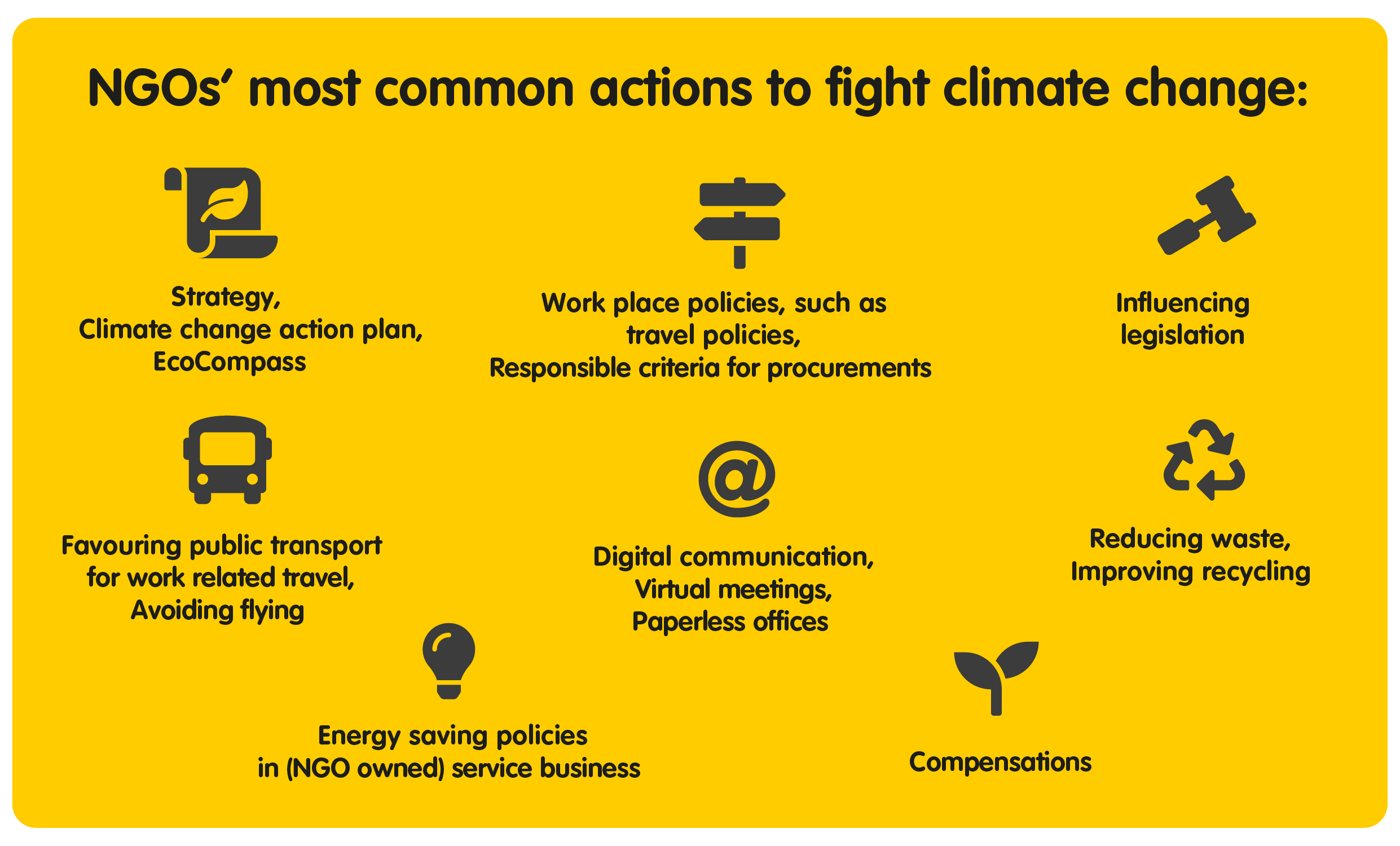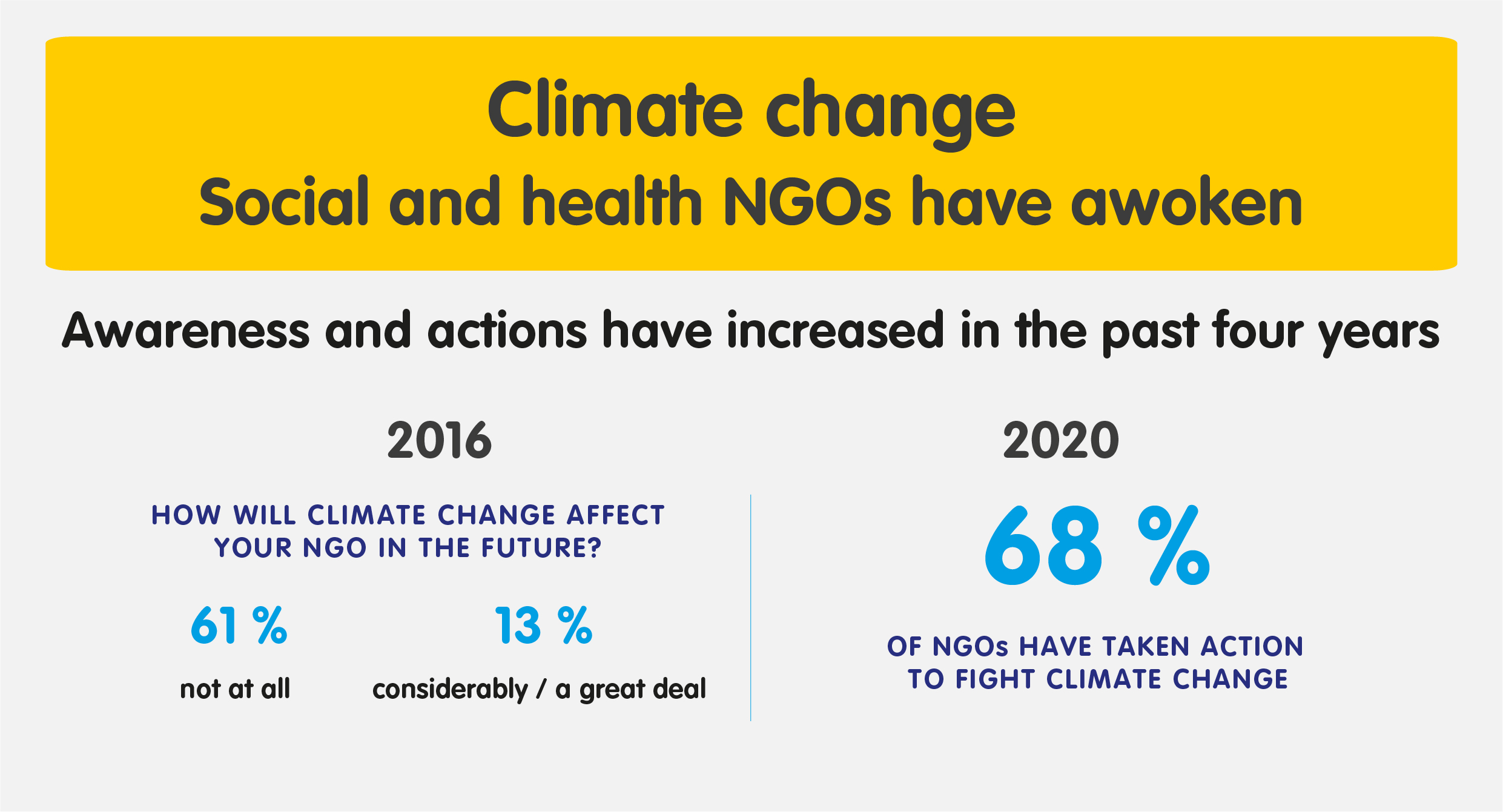The Agenda 2030 goals require immediate and concrete climate action from all stakeholders. Finnish NGOs Agenda 2030 work is implemented together with a large civil society coalition. However, even though there are thousands of registered NGOs in Finland, the role of NGOs in enhancing climate responsibility has not been considered in the past. According to NGO barometer 2016, 61 % of social and health NGOs viewed that climate change will not affect their NGO in the future. Four years later 68% of social and health NGOs already have taken action to fight climate change.
According to the Interim review of the Implementation of the National Climate Change Adaptation Plan 2020 (pdf), in social and health care sector the awareness of climate change and the risks it causes, indirect effects and adaptation needs, is low.
SOSTE launched its climate work in spring 2020 and to acquire a broader view on the preparedness of Finnish social and health (care) sector, SOSTE commissioned a report: Climate change and the social and health sector. It was produced by MDI and Tietotakomo. Summary of the report can be found below.
In addition, SOSTE conducted a national survey for social and health NGOs concerning their views on climate change. Main findings and SOSTE’s recommendations below.
SOSTE’s objectives concerning climate change
- raise awareness of the risks and impacts of climate change on human wellbeing and health and the need for urgent climate action
- enhance resilience to the effects of climate change in the social and health sector, along with reducing emissions
- highlight the needs of vulnerable groups in society, with respect to fair transition and adaptation
- encourage and support social and health NGOs to develop and implement climate action/policies into their work
- ensure that the effects of climate change on people’s wellbeing is taken into consideration in both public discussion and decision-making processes
SOSTE’s actions
- climate action plan (in progress)
- climate change webpage
- trainings, workshops and webinars for member organisations
- statements, surveys and publications concerning climate change, recommendations for action
- advocacy work and lobbying
Summary of report: Climate change and the social and health sector
Read the report in Finnish (pdf), Mayer, Manu, Siltanen, Nurminen, Talvitie, Haanpää and Smith, 2020, SOSTE publications.
Climate change is increasingly a question of human wellbeing. Global warming affects spreading of diseases, food safety, conflicts and immigration. In Finland climate change increases in particular the risk of health problems caused by hot weather during summer, spreading of infectious diseases, slipping injuries, and indoor air problems and mental health issues caused by moisture damages. In addition, climate change can put people’s livelihoods at risk and decrease sense of security. People in vulnerable position have fewer options to prepare themselves for the negative effects of climate change.
Although it is known that climate change affects social and environmental determinants of health, the social and health (care) sector’s preparedness and precautionary measures are lagging behind other sectors and international counterparts. To proceed from awareness to action, social and health care sector needs incentives and steering on a national, regional and local level as well as enhancing cooperation between different sectors.
The report describes many possible roles for social and health NGOs in climate action:
- NGOs can activate civil society, do advocacy work, produce and disseminate information and enhance their own preparedness for climate change. Social and health NGOs have a special potential to reach such target groups that otherwise would not be exposed to the climate change debate. In addition,
- NGOs can bring important information for decision-making, from the viewpoint of vulnerable groups and the challenges they face in preparedness for climate change as well as views on just transition.
- Social and health NGOs with their 1,3 million members, 50.000 employees and 500.000 volunteers have a great impact on climate action, whether it includes activating members, advocacy work or reducing NGO’s own carbon footprint.
As part of the report, a workshop was organised for social and health NGOs. Based on that, it can be claimed, that Finnish social and health NGOs have three focus areas in their climate action:
- NGO’s own work and its climate sustainability: eg. calculating carbon footprints, introducing climate strategies or action plans (including remote working and travel policies)
- NGO’s target groups and their special needs and wishes regarding climate issues and resilience
- Participating in public discussion on climate change, mapping the effects of climate change for their target groups and advocacy work for people in vulnerable position
Social and health NGO barometer survey 2020
National survey for social and health NGOs on their views and actions concerning climate change among other topics. Survey was conducted by SOSTE. Read the survey in Finnish. Number of respondents: national organisations: 107 and local organisations: 1 091.
Main findings
Social and health NGOs have awoken to climate change issues over the past four years. In 2016, many NGOs believed that climate change would not significantly affect their work. Now almost 70% have climate change action plans.
Social and health NGOs have a lot of information concerning their target groups challenges. Combining this information with what is known about the direct and indirect effects of climate change is in a key position to NGOs, when planning successful climate actions. Finding out the climate change related concerns and wishes of target groups will help NGOs to develop climate change actions that are in line with the NGOs main objectives. It will also help disseminate information on the effects of climate change.
SOSTEs recommendations
Based on the findings of the survey, SOSTE sees that climate and environmental issues should be included in the (governmental) funding scheme guidelines and criteria. (Social and health NGOs receive over EUR 300 million yearly from the Ministry of Social Affairs and Health). This would encourage NGOs to evaluate and improve the sustainability of their activities. Funding for climate action would help combat the risks posed by the effects of climate change, especially for target groups of social and health NGOs (including vulnerable groups).
In addition, SOSTE finds that it is important that national NGOs involve local member organisations as well as their members and volunteers in the climate action work. Social and health NGOs have over 500.000 volunteers and 1,3 million members. Activation of members and volunteers is crucial to the effective climate action work of NGOs.

